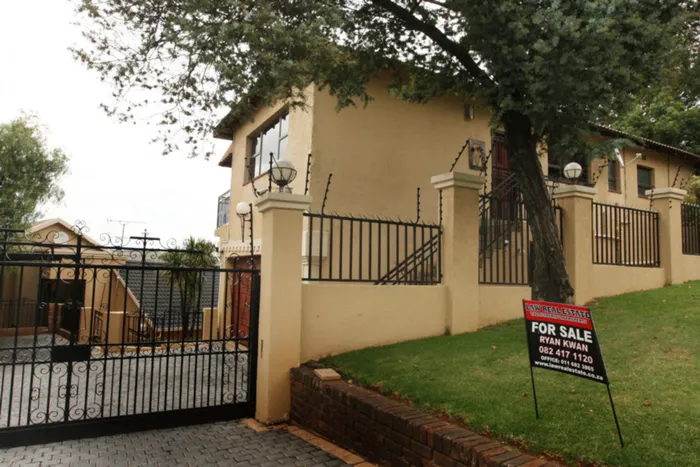South Africa's residential property prices surge: 5.0% inflation recorded in December 2024

A residential property that was for sale in Marlberton, South of Johannesburg.
Image: Simphiwe Mbokazi
South Africa's annual national residential property price inflation was 5.0% in December last year, an increase from 4.9% in November 2024.
This is according to the Residential Property Price Index (RPPI) December 2024, released by Statistics South Africa on Thursday, which shows that the residential property price index (RPPI) increased by 0.4% month-on-month in December 2024.
“The main contributors to the 5.0% annual national inflation rate were Western Cape (8.6% and contributing 3.1 percentage points) and Gauteng (2.3% and contributing 0.9 of a percentage point),” it read.
The RPPI for all metropolitan areas increased by 4.8% between December 2023 and December 2024.
The main contributors to the 4.8% annual inflation rate for metropolitan areas were said to be City of Cape Town (8.1% and contributing 2.7 percentage points) and City of Johannesburg (3.4% and contributing 0.7 of a percentage point).
The RPPI for properties sold for the first time increased by 5.2% between December 2023 and December 2024. The index increased by 0.5% month-on-month in December 2024.
The RPPI for resold properties increased by 5.3% between December 2023 and December 2024. The index increased by 0.5% month-on-month in December 2024.
The RPPI for sectional title properties increased by 3.4% between December 2023 and December 2024. The index increased by 0.4% month-on-month in December 2024.
The RPPI for freehold properties increased by 5.7% between December 2023 and December 2024. The index increased by 0.5% month-on-month in December 2024.
Commenting on this data print, Dr Roelof Botha, an economist and economic advisor to the Optimum Investment Group, said the latest residential property price index for South Africa, published by Stats SA, is not aligned with two key indices generated by private sector property indices.
He said both the BetterBond House Price Index and the FNB House Price Index were at levels below 5% for December 2024, reported by Stats SA.
“According to the BetterBond Index, house prices had risen by 3.2% in nominal terms during 2024 and by merely 0.2% in real terms. South Africa’s residential property market has been under stress ever since the Monetary Policy Committee (MPC) of the Reserve Bank decided to raise the prime overdraft rate (via the repo rate) to its highest level in 15 years.
"It is abundantly clear that high interest rates have come at a substantial cost to the economy, especially via a consistent lowering of per capita disposable incomes in real terms,” Botha said.
He added that the latter represents the dominant driver of aggregate demand in the economy and, as an inference, GDP growth. #
“In 2021, on the back of a nominal prime rate that was 400 basis points lower than currently, the country’s real per capita disposable income recovered to within a whisker of the level immediately before the Covid lockdowns.
"Since then, it has declined by more than 2.6% to just above R74 000, compared to more than R78 000 when Gill Marcus was in charge of monetary policy. The current real prime rate (prime minus the CPI) is at 8.3%, which is 168% higher than the average during the tenure of Gill Marcus.”
Botha said the excessively high interest rates are making it difficult for the economy to grow at rates that are conducive to meaningful employment creation, and they also effectively act as a tax on venture capital.
“Several property market experts have criticised the halting of the MPC’s rate-cutting cycle, pointing out that almost a quarter of current home sales are driven by financial distress.”
Stats SA said in line with the RPPI methodology, the weights of the RPPI will be updated with effect from the January 2025 release (to be published in June 2025).
The weights represent the proportion of sales value per area in 2023 based on the final dataset used to calculate the RPPI.
Independent Media Property
Related Topics: